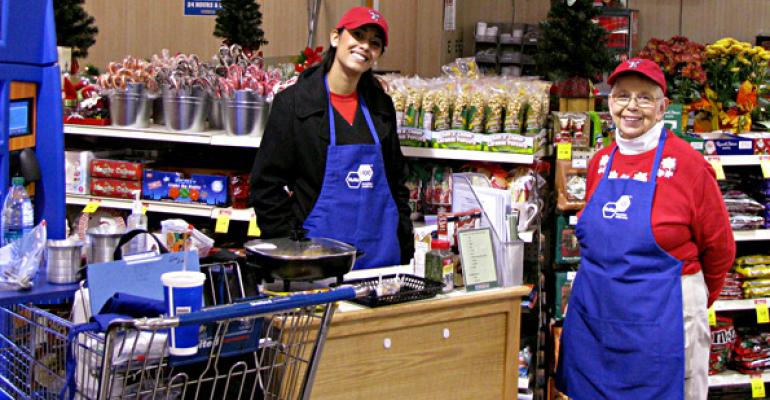MULESHOE, Texas — A United Supermarkets here is flagging nutrient-dense foods and teaching residents how to cook with them as part of a bid to prevent cancer in a rural community.
The outreach, themed “Cut Your Risk, Boost Your Health,” is part of a project addressing the most preventable sources of cancer: obesity, tobacco and sunburn, in Muleshoe, Texas.
Led by Texas Tech University Health Sciences Center with funding from the Cancer Prevention Research Institute of Texas, it runs through February 2013.
The project centers on a rural population since cancer diagnoses tend to reach these patients at a more advanced stage than in larger cities. It will be replicated in other small communities if
successful.
“Weight status is very much a risk factor for numerous types of cancers, so that’s one of the things we’re tracking,” said Tyra Carter, corporate dietitian for United Supermarkets.
More than 200 randomly selected residents are being evaluated through measurements of body mass index and blood pressure, combined with an analysis of three-day food records and survey data assessing health status and cancer-preventing behaviors.
United’s sales records will be reviewed to gauge the effectiveness of educational materials emphasizing cancer-preventing foods. This will be done on aggregate since the store doesn’t track individuals’ purchases.
“We’ll see if there is a change in shoppers’ purchase patterns compared to historical trends and to a control store: so ‘are items with higher NuVal scores being purchased more
frequently than would have been predicted without the study?’” said Conrad Lyford, Texas Tech professor and project director.
United is using shelf-talkers in the Muleshoe store to draw attention to the most nutrient-rich foods as measured on the NuVal scale, which assigns a score from 1 to 100. Whole grain pasta, fat free milk, fruits and vegetables are just a few of the products flagged. The effort comes at a time when many are still unaware of NuVal’s existence, Carter noted.
“We’ve never used shelf talkers to focus on NuVal’s higher-scoring foods so this is a new concept,” she said.
Shortly after hanging the signs, United and its Texas Tech partners agreed the strategy needed refining. The team found that their choice of color was blending with private-label packaging that uses a similar shade.
The green signs were so ineffective that when Lyford walked the store he relied on a printed list to identify tagged foods rather than the shelf talkers themselves. The green tags were scrapped for a more eye-catching sky blue.
Shelf talkers are just one of the ways the Muleshoe location is distinguishing itself from the control store. It also hosts recipe demos twice a month. In
December it presented cranberry chutney and orange pilaf as easy ways to increase fruit consumption.
The recipes come from the Texas Tech team and are reviewed by Carter who makes sure they jibe with all things “United”.
“We don’t want people walking in and thinking Texas Tech is taking over. We want to make sure that what they’re seeing and hearing has the United look and feel,” Carter said.
Recipes are printed on cards with nutrition information and healthy eating tips for distribution during the demos.
The cost of events held at United or elsewhere in the community are funded by the grant. Compensation for time spent by United employees on tasks related to the project are likewise paid for this way.
Food sampling and consumer education that focus on cancer risk factors and the importance of preventive actions are held at venues where the Boy Scout’s, Lion’s Club and other community groups convene.
Classes are taught by Lyford and members of his team. Educators stress the importance of using NuVal when shopping for food and provide simple preventive steps such as wearing a hat to protect against the dangers of the sun.
“We’re focused on getting information out to people so there is broad awareness in the community of what we’re trying to do,” he said.
Texas Tech hand-selected United Supermarkets for the project.
“It seemed to me and to some people on our team that supermarkets could be a fantastic way to get information to people about how to improve health,” Lyford said. “United has very innovative and focused ways to provide health information to the people they serve.”
Muleshoe was chosen for its size, proximity to Texas Tech and the ability of researchers to control messages to the community.
The test ground was particularly desirable given the lack of other supermarkets and likelihood of residents to do the majority of their shopping at a NuVal store. United is one of just two in Texas to host the nutrition rating system.



